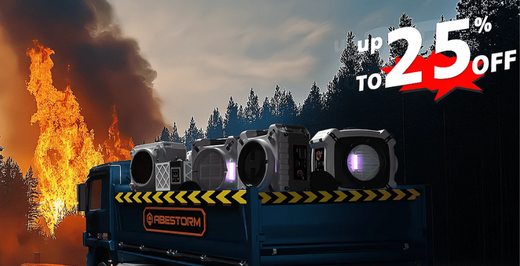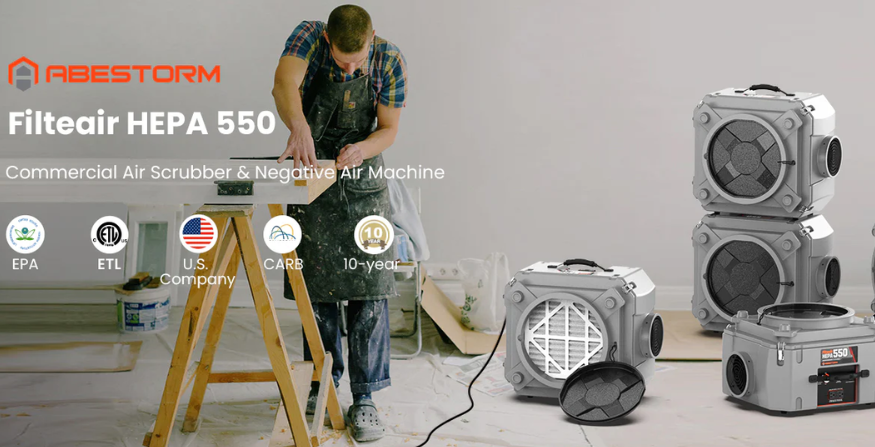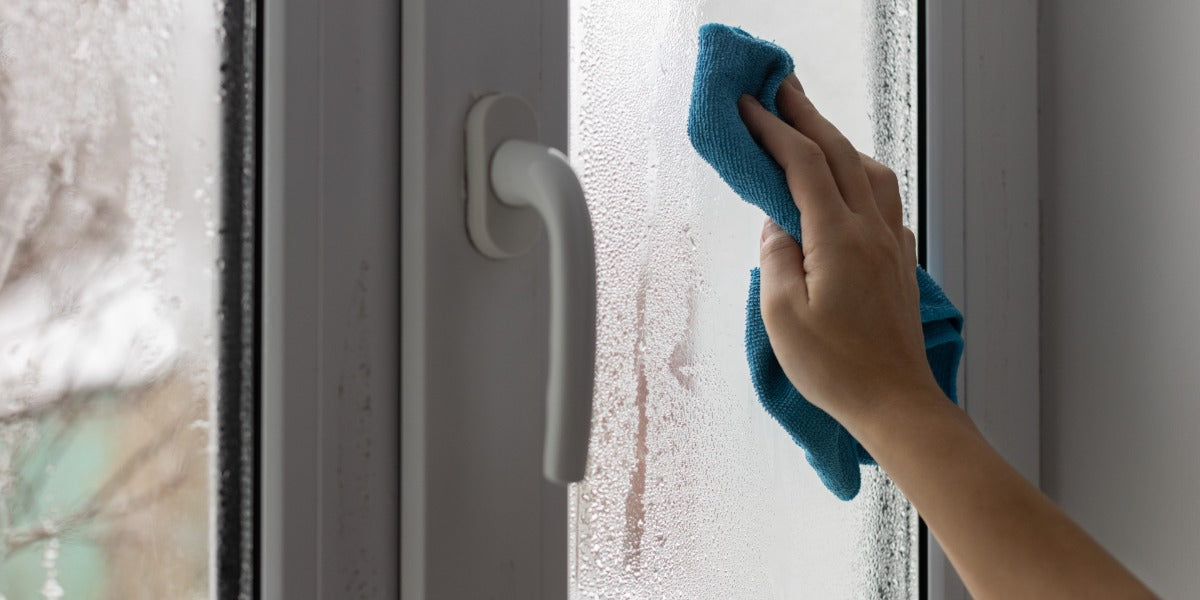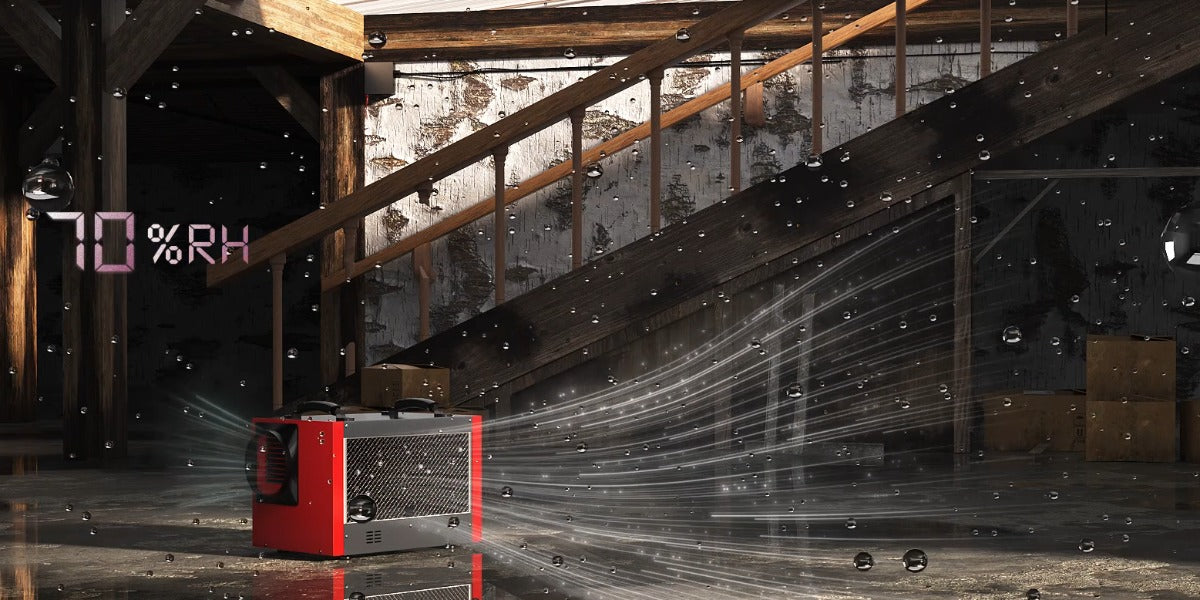If you're battling excess moisture in your home, a dehumidifier could be the perfect solution to your problem. But, how much is a dehumidifier? Before investing money in a dehumidifier, you should know what you're getting into. Whether you're curious about the cost of a small unit for a damp basement or need a powerful whole-house system, this guide will walk you through everything you need to know about dehumidifier costs in 2024. From the price tags of different models to installation fees and the factors that can drive costs up or down, we've got you covered.
Types of Dehumidifiers and Their Costs
When selecting a dehumidifier, it's crucial to choose the right type based on your needs and budget. Here’s a breakdown of the most common dehumidifier types and their associated costs:
Portable Dehumidifiers
Portable dehumidifiers are compact units designed for easy movement between rooms. They are ideal for addressing moisture issues in smaller spaces like bedrooms, basements, or living areas.
Price Range: Lower-end models range from $150 to $300
Features: Most portable dehumidifiers come with adjustable humidity settings, built-in pumps, and washable filters. Some models also offer smart controls and energy-saving modes like auto-off and sleep mode.
Coverage Area: Typically effective for areas up to 1,500 square feet, though larger models may cover more.
Portable units are often chosen for their convenience and affordability. For a basic model, expect to pay around $200 to $300. High-end models with advanced features and higher capacities can cost upwards of $400 to $500.
Whole-House Dehumidifiers
Whole-house dehumidifiers are designed to work with your home’s HVAC system to manage humidity levels throughout the entire house. These systems are ideal for larger homes where consistent humidity control is needed in multiple rooms.
Price Range: $1,000 to $2,500 (unit only)
Features: Whole-house models generally come with high-capacity tanks, advanced humidity controls, and integration with home HVAC systems. They are often equipped with MERV 8 filters that improve air quality.
Coverage Area: Typically effective for homes up to 3,000 square feet or more, depending on the model.
While these dehumidifiers represent a larger investment, they offer comprehensive coverage and often feature more durable construction. According to Angi.com, you can expect to pay $1,300 - $2,800 to install a whole-house dehumidifier with high capacities and advanced features.
Crawlspace Dehumidifiers
Crawlspace dehumidifiers are specifically designed for areas prone to high moisture levels, such as basements and crawlspaces. They are built to handle more severe humidity conditions and protect these critical areas from mold and mildew.
Price Range: $300 - $800
Features: These units are built solid, with high-capacity tanks and enhanced drainage systems. Many models are designed to operate efficiently in cooler temperatures and can withstand the harsher conditions of crawlspaces.
Coverage Area: Depending on the size and capacity, these models can effectively cover areas from 1,200 to 3,500 square feet.
For example, the Abestorm 113-pint Guardian SN55 Crawl Space Dehumidifier is priced at $499 and the 120-pint Guardian SN55 Crawl Space Dehumidifier is $551.36. Higher capacity models, such as the 220 and 235-pint units, are priced at $1,399 and $1,599, offering more extensive coverage and durability. The larger capacity units can also be integrated and used for whole-house dehumidification.
Choosing the right dehumidifier depends on your specific needs, the size of the area to be dehumidified, and your budget. Each type offers distinct advantages, whether it’s portability, whole-house coverage, or specialized crawlspace management.
Factors Influencing the Cost of Dehumidifiers
Capacity and Coverage Area
The capacity of a dehumidifier, often measured in pints of moisture removed per day, is one of the primary factors influencing cost. Larger units that can dehumidify bigger spaces typically cost more. For example, a small 30-pint dehumidifier suitable for a bedroom or small basement might cost around $150, while a large 70-pint model could exceed $300.
Energy Efficiency
Energy-efficient dehumidifiers may have a higher upfront cost, but they can save you money in the long run by reducing your electricity bills. Look for models with Energy Star certification, which use less energy while still providing effective moisture control.
Brand and Quality
Premium brands often come with a higher price tag, reflecting their reliability, build quality, and customer service. Brands like Abestorm are known for their durable, high-performance units that, while more expensive, offer long-term savings through durability and energy efficiency.
Additional Features
Features such as digital controls, auto-shutoff, timers, and smart home compatibility can add to the cost of a dehumidifier. While these features are convenient, consider whether they are necessary for your situation before paying extra.
Installation Requirements
For whole-house dehumidifiers, professional installation is usually necessary, which adds to the overall cost. Installation fees can range from $500 to $2,000 depending on the complexity of the job and your location. DIY installation is possible for those with the right skills, potentially saving money.
Installation Costs for Whole-House Dehumidifiers
Professional Installation vs. DIY
Professional installation ensures that the unit is correctly connected to your HVAC system and is operating efficiently. While it adds to the initial cost, it can prevent issues down the line. DIY installation might save on upfront costs but could lead to problems if not done correctly.
Average Installation Costs
Expect to pay between $500 and $2,000 for professional installation, depending on the complexity of the job. Factors such as the size of your home, the existing HVAC setup, and the type of dehumidifier can all affect the final price.
Factors Affecting Installation Price
The layout of your home, the condition of your existing HVAC system, and the location of the dehumidifier can all influence installation costs. Homes with older systems or complex layouts may require more labor, driving up the price.
Operating Costs
Energy Consumption and Efficiency Ratings
Dehumidifiers with high energy efficiency ratings may have higher upfront costs but will consume less electricity, saving you money over time. Consider the unit's Energy Factor (EF) rating, which measures dehumidification efficiency per kilowatt-hour of electricity used.
Estimated Monthly Electricity Costs
Operating a dehumidifier typically costs between $10 and $30 per month, depending on the size of the unit and local electricity rates. Whole-house units generally consume more power than portable models, so it's essential to factor in these ongoing costs when choosing a unit.
Maintenance Expenses
Regular maintenance, such as cleaning filters and ensuring proper drainage, is crucial for the longevity and efficiency of your dehumidifier. While these tasks are usually simple, neglecting them can lead to higher operating costs and reduced effectiveness.
Ways to Save on Dehumidifier Costs
Energy-Efficient Models
Investing in an energy-efficient dehumidifier can reduce your long-term operating costs. Look for units with the Energy Star label. This indicates they meet strict energy efficiency guidelines set forth by the U.S. Environmental Protection Agency (EPA).
Seasonal Sales and Discounts
Keep an eye out for sales events, particularly during off-peak seasons like late fall or early winter when demand for dehumidifiers is lower. Many retailers offer discounts that can significantly reduce your upfront costs.
Rebates and Tax Incentives
Some energy-efficient models may qualify for rebates or tax incentives, reducing the overall cost of your dehumidifier. Check with your local utility company or government programs for available offers.
Proper Maintenance for Longevity
Regular maintenance, such as cleaning filters and checking drainage systems, can extend the life of your dehumidifier, reducing the need for costly repairs or replacements.
How to Choose the Right Dehumidifier for Your Budget
Assessing Your Needs
Consider the size of the area you need to dehumidify, the typical humidity levels in your home, and your budget when choosing a dehumidifier.
Balancing Cost with Features and Efficiency
While it might be tempting to opt for the cheapest model, investing in a higher-quality, energy-efficient unit can save you money in the long run through lower operating costs and better performance.
Invest in Quality
Choosing the right dehumidifier requires careful consideration of both upfront and long-term costs. Whether you opt for a portable unit or a whole-house system, it's important to balance your budget with the features and efficiency you need. By understanding the factors that influence dehumidifier costs, you can make an informed decision.
Among the various brands available, Abestorm is recognized for offering a range of high-quality, energy-efficient dehumidifiers that cater to different needs and budgets. With a commitment to innovation and customer satisfaction, Abestorm's products are designed to provide reliable moisture control, ensuring the comfort and health of your home.









Shop For Dehumidifier